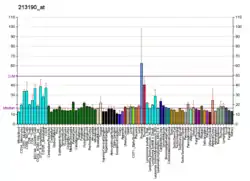COG7
Conserved oligomeric Golgi complex subunit 7 is a protein that in humans is encoded by the COG7 gene.[5][6]
Multiprotein complexes are key determinants of Golgi apparatus structure and its capacity for intracellular transport and glycoprotein modification. Several complexes have been identified, including the Golgi transport complex (GTC), the LDLC complex, which is involved in glycosylation reactions, and the SEC34 complex, which is involved in vesicular transport. These 3 complexes are identical and have been termed the conserved oligomeric Golgi (COG) complex, which includes COG7 (Ungar et al., 2002).[supplied by OMIM][6]
References
- GRCh38: Ensembl release 89: ENSG00000168434 - Ensembl, May 2017
- GRCm38: Ensembl release 89: ENSMUSG00000034951 - Ensembl, May 2017
- "Human PubMed Reference:". National Center for Biotechnology Information, U.S. National Library of Medicine.
- "Mouse PubMed Reference:". National Center for Biotechnology Information, U.S. National Library of Medicine.
- Ungar D, Oka T, Brittle EE, Vasile E, Lupashin VV, Chatterton JE, Heuser JE, Krieger M, Waters MG (Apr 2002). "Characterization of a mammalian Golgi-localized protein complex, COG, that is required for normal Golgi morphology and function". J Cell Biol. 157 (3): 405–15. doi:10.1083/jcb.200202016. PMC 2173297. PMID 11980916.
- "Entrez Gene: COG7 component of oligomeric golgi complex 7".
- Loh, Eva; Hong Wanjin (Jun 2004). "The binary interacting network of the conserved oligomeric Golgi tethering complex". J. Biol. Chem. 279 (23): 24640–8. doi:10.1074/jbc.M400662200. ISSN 0021-9258. PMID 15047703.
Further reading
- Andersson B, Wentland MA, Ricafrente JY, et al. (1996). "A "double adaptor" method for improved shotgun library construction". Anal. Biochem. 236 (1): 107–13. doi:10.1006/abio.1996.0138. PMID 8619474.
- Yu W, Andersson B, Worley KC, et al. (1997). "Large-scale concatenation cDNA sequencing". Genome Res. 7 (4): 353–8. doi:10.1101/gr.7.4.353. PMC 139146. PMID 9110174.
- Loh E, Hong W (2002). "Sec34 is implicated in traffic from the endoplasmic reticulum to the Golgi and exists in a complex with GTC-90 and ldlBp". J. Biol. Chem. 277 (24): 21955–61. doi:10.1074/jbc.M202326200. PMID 11929878.
- Strausberg RL, Feingold EA, Grouse LH, et al. (2003). "Generation and initial analysis of more than 15,000 full-length human and mouse cDNA sequences". Proc. Natl. Acad. Sci. U.S.A. 99 (26): 16899–903. Bibcode:2002PNAS...9916899M. doi:10.1073/pnas.242603899. PMC 139241. PMID 12477932.
- Clark HF, Gurney AL, Abaya E, et al. (2003). "The secreted protein discovery initiative (SPDI), a large-scale effort to identify novel human secreted and transmembrane proteins: a bioinformatics assessment". Genome Res. 13 (10): 2265–70. doi:10.1101/gr.1293003. PMC 403697. PMID 12975309.
- Ota T, Suzuki Y, Nishikawa T, et al. (2004). "Complete sequencing and characterization of 21,243 full-length human cDNAs". Nat. Genet. 36 (1): 40–5. doi:10.1038/ng1285. PMID 14702039.
- Loh E, Hong W (2004). "The binary interacting network of the conserved oligomeric Golgi tethering complex". J. Biol. Chem. 279 (23): 24640–8. doi:10.1074/jbc.M400662200. PMID 15047703.
- Wu X, Steet RA, Bohorov O, et al. (2004). "Mutation of the COG complex subunit gene COG7 causes a lethal congenital disorder". Nat. Med. 10 (5): 518–23. doi:10.1038/nm1041. PMID 15107842. S2CID 29322859.
- Gerhard DS, Wagner L, Feingold EA, et al. (2004). "The status, quality, and expansion of the NIH full-length cDNA project: the Mammalian Gene Collection (MGC)". Genome Res. 14 (10B): 2121–7. doi:10.1101/gr.2596504. PMC 528928. PMID 15489334.
- Oka T, Vasile E, Penman M, et al. (2005). "Genetic analysis of the subunit organization and function of the conserved oligomeric golgi (COG) complex: studies of COG5- and COG7-deficient mammalian cells". J. Biol. Chem. 280 (38): 32736–45. doi:10.1074/jbc.M505558200. PMID 16051600.
- Rual JF, Venkatesan K, Hao T, et al. (2005). "Towards a proteome-scale map of the human protein-protein interaction network". Nature. 437 (7062): 1173–8. Bibcode:2005Natur.437.1173R. doi:10.1038/nature04209. PMID 16189514. S2CID 4427026.
- Steet R, Kornfeld S (2006). "COG-7-deficient Human Fibroblasts Exhibit Altered Recycling of Golgi Proteins". Mol. Biol. Cell. 17 (5): 2312–21. doi:10.1091/mbc.E05-08-0822. PMC 1446086. PMID 16510524.
- Morava E, Zeevaert R, Korsch E, et al. (2007). "A common mutation in the COG7 gene with a consistent phenotype including microcephaly, adducted thumbs, growth retardation, VSD and episodes of hyperthermia". Eur. J. Hum. Genet. 15 (6): 638–45. doi:10.1038/sj.ejhg.5201813. PMID 17356545.
External links
- GeneReviews/NCBI/NIH/UW entry on Congenital Disorders of Glycosylation Overview
- Human COG7 genome location and COG7 gene details page in the UCSC Genome Browser.
This article is issued from Wikipedia. The text is licensed under Creative Commons - Attribution - Sharealike. Additional terms may apply for the media files.




